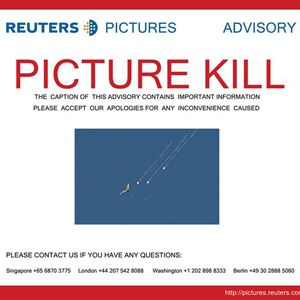
Reuters Photographer Fired for Photo Manipulation
A storm is brewing over the world of photojournalism. Revelations of photo manipulation by a Reuters photographer surfaced; meanwhile, questions of fraud have arisen about images taken by Associated Press and Agence France Presse photographers.
Reuters was forced to fire its longtime Lebanese freelance photographer Adnan Hajj and pull over 900 photos from the Reuters database after it discovered that he had doctored photos in order to increase their sensational appeal and cast Israel in a negative light.
For its part, Reuters has said it was unaware that any of the altered images had been used by any major newspaper and that it would review how the photos escaped internal scrutiny.
Since the Israeli-Hezbollah war began, Hajj has had a number of photographs featured in some of the world’s most prominent dailies, including an August 5 front-page photo for the New York Times. The photo depicts a supposed civilian victim of Israeli aggression.
But Reuters photos are not the only images under scrutiny. On August 8, the Committee for Accuracy in Middle East Reporting in America (camera) suggested other questionable images from Associated Press and Agence France Presse could also have been staged and distributed for use around the world. The images can be seen here.
As the camera article reports, images are worth a thousand words and make a major impact on general public opinion. Even if the fraud is caught, as in the case of Adnan Hajj, the damage has already been done.
camera wrote,
If anyone needed proof that images have immense power—often more than the printed word—to sway public opinion, one had only to listen to the words of celebrity Bianca Jagger speaking at a London demonstration calling for an immediate ceasefire on Saturday. She told thousands gathered at the anti-Israel rally that she felt compelled to speak out because “watching the images of innocent children dying as we have been for the last 24 days does not promote a peaceful solution in the region.”
But as camera explains, “[A]ll too many of the images that shape the perceptions of Jagger and countless others have been manipulated“ (emphasis ours).
Since the Israeli-Hezbollah war began, we have seen a tremendous shift in world opinion from supporting Israel’s right to self defense to being very critical of Israel’s ongoing offensive. Doctored images which portray Israel as a war mongering entity rather than a victim of Hezbollah aggression have been used as a powerful tool to effectively manipulate world opinion.
